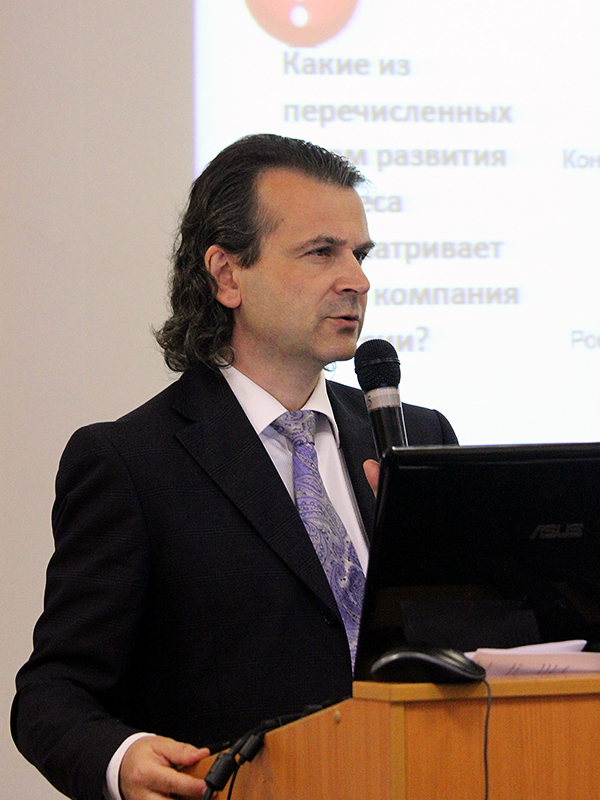
Regulatory changes in the procedure of expert review and registration of new drugs are needed towards localization of innovative pharmaceutical products in Russia – Vladimir Gurdus
02 April 2013
"To improve quality and safety of new drugs to be introduced to the Russian market and for localization of innovative pharmaceutical products in the country, the expert review and registration of such products require procedural changes”, - Vladimir Gurdus, CEO of D-Pharma, LLC, a managing company of “RusnanoMedInvest” and “NovaMedica” projects stated at the Conference “State regulation and the Russian pharmaceutical industry 2013: continuation of the dialogue”.
 He informed of general propositions filed by the RF government panel of experts with the RF Ministry of Health during deliberations on changes to the Federal Law “On the Circulation of Medicines”. V. Gurdus noted in particular that the panel has proposed to introduce a requirement to the Law subject to NDA to be filed only by a legal entity duly established and existing under the Russian law. According to the experts, this will result in more civic responsibility for safety of new pharmaceuticals to be placed on developers.
He informed of general propositions filed by the RF government panel of experts with the RF Ministry of Health during deliberations on changes to the Federal Law “On the Circulation of Medicines”. V. Gurdus noted in particular that the panel has proposed to introduce a requirement to the Law subject to NDA to be filed only by a legal entity duly established and existing under the Russian law. According to the experts, this will result in more civic responsibility for safety of new pharmaceuticals to be placed on developers.
"Moreover the Russian market will have a legal entity whom the end user can follow easily and interact within the framework available", - Vladimir said.
He also stressed the need for the expert review process to be as transparent as possible when registering new pharmaceutical products.
"Wording of “Expert review regulations” must be posted on the Internet and engaged experts shall undergo an annual refresher training, - the speaker explained.
Also V.Gurdus indicated the proposition made by the panel of experts regarding the introduction of protocol meetings between representatives of regulatory body and the applicant to discuss issues related to the results of clinical drug trials.
"Now it is widely used in FDA and in EMA. We believe whichever organization will take a lead in this process it shall introduce alike procedures, - he continued, - This may result in enhancements in the quality of interactions between the regulatory body and the industry, will make the process more transparent and predictable and mitigate the risk of corruption".
Vladimir Gurdus informed of the international best practice in localizing innovations in the pharmaceutical industry on leading markets to have been analyzed when drafting proposals by the working.
He noted that main efforts of the US government are aimed at protection of interests of the national industry in the course of international trade relations. In particular US government bodies are engaged in the active process of getting better preferences for US pharmaceutical companies. This involves conclusion of agreements subject to unilateral changes in unfavorable regulatory requirements or to retain those favorable concerning the circulation of medicines in partner nations (i.e. China, Russia, Japan and etc); solving problems encountered in US pharmaceutical companies (i.e. Nigeria, Columbia) at a political level.
In addition activities of companies are intentionally stimulated by the US governmental bodies in areas of national priority fit. For instance, thanks to amendments adopted to the US Federal Law on food, drug and cosmetics concerning preferences set forth in special clinical drug trials of kids groups and orphan products, the activity of companies has been stimulated in these areas.
V. Gurdus said that EU countries also take necessary measures to expedite the R&D activity of pharmaceutical companies. For instance, a G10 has been formed by EU Commission which generated a report specifying 14 proposals on innovation incentives, the availability of drugs for patients, the market structure in Europe, competition and regulations in the sector. Moreover the EU Commission has announced “the call for an action: strengthening of the European pharma industry to the benefit of patients”.
"Concurrently pharmaceuticals have a legal entity only registration in EU and USA duly established and existing under the national legislation" – V. Gurdus highlighted, - These countries focus their efforts on protection of own producers of pharmaceutical products and localization of global cutting-edge technologies and pharm products domestically".
He said that the Russian market is attractive for global producers of pharmaceutical products because it is almost the size of the leading markets in Europe and is entering the top ten. "Our market is of interest for foreign producers but they, however, count on the import but not on the localization of drugs in Russia," – Vladimir noticed.
"Whether the drive for incentive programs in regard to localization of production in Russia will work to apply to foreign producers, this will largely depend on our efforts in favor of changes to be adopted in the applicable legislation" – the speaker summarized.
PrintOur news
-
Merry Christmas and Happy New Year!
28 December 2024
-
NovaMedica team in the TOP 100 INFLUENTIAL PEOPLE IN THE PHARMACEUTICAL BUSINESS 2024
28 November 2024
-
05 November 2024
Media Center
-
Enhancing spectroscopy analysis with machine learning
03 February 2025
-
The production of new Russian “super antibiotic” to begin in Novosibirsk
03 February 2025
-
A Russian company has started producing 4 veterinary vaccines
31 January 2025
-
The government held its first meeting on the “New technologies for preserving health” project
31 January 2025